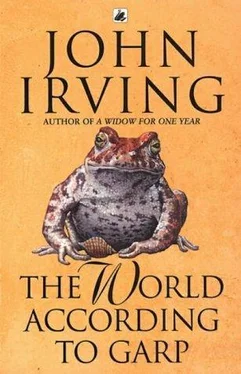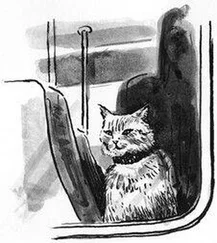Ernie Holm was sensitive to people who were bored. He had married a nurse sixteen years earlier; when Helen had been born, the nurse gave up her nursing to be a full-time mother. After six months she wanted to be a nurse again, but there were no day-care centers in Iowa in those years, and Ernie Holm's new wife grew gradually more distant under the strain of being a full-time mother and an ex-nurse. One day she left him. She left him with a full-time daughter and no explanation.
So Helen Holm grew up in wrestling rooms, which are very safe for children—being padded everywhere, and always warm. Books had kept Helen from being bored, although Ernie Holm worried how long his daughter's studiousness could continue to be nourished in a vacuum. Ernie was sure that the genes for being bored were in his daughter.
Thus he came to Steering. Thus Helen, who also wore glasses—as needfully as her father—was with him that day Jenny Fields walked into the wrestling room. Jenny didn't notice Helen; few people noticed Helen, when Helen was fifteen. Helen, however, noticed Jenny right away; Helen was unlike her father in that she didn't wrestle with the boys, or demonstrate moves and holds, and so she kept her glasses on .
Helen Holm was forever on the lookout for nurses because she was forever on the lookout for her disappeared mother, whom Ernie had made no attempt to find. With women, Ernie Holm had some experience at taking no for an answer. But when Helen had been small, Ernie had indulged her with a speculative fable he no doubt liked to imagine himself—it was a story that had always intrigued Helen, too. “One day,” went the story, “you might see a pretty nurse, sort of looking like she doesn't know where she is anymore, and she might look at you like she doesn't know who you are, either—but she might look curious to find out.”
“And that will be my mom?” Helen used to ask her father.
“And that will be your mom!” Ernie used to say.
So when Helen Holm looked up from her book in the Steering wrestling room, she thought she saw her mother. Jenny Fields in her white uniform was forever appearing out of place; there on the crimson mats of the Steering School, she looked dark and healthy, strong-boned and handsome if not exactly pretty, and Helen Hohn must have thought that no other woman would have ventured into this soft-floored inferno where her father worked. Helen's glasses fogged, she closed her book; in her anonymous gray sweat suit, which hid her gawky fifteen-year-old frame—her hard hips and her small breasts—she stood up awkwardly against the wrestling-room wall and waited for her father's sign of recognition.
But Ernie Holm was still groping for his glasses; in a blur he saw the white figure—vaguely womanly, perhaps a nurse—and his heart paused at the possibility he had never really believed in: his wife's return, her saying, “Oh, how I've missed you and our daughter!” What other nurse would enter his place of employment?
Helen saw her father's fumbling, she took this to be the necessary sign. She stepped toward Jenny across the blood-warm mats, and Jenny thought: My God, that's a girl ! A pretty girl with glasses. What's a pretty girl doing in a place like this?
“Mom?” the girl said to Jenny. “It's me , Mom! It's Helen ,” she said, bursting into tears; she flung her slim arms around Jenny's shoulders and pressed her wet face to Jenny's throat.
“Jesus Christ!” said Jenny Fields, who was never a woman who liked to be touched. Still, she was a nurse and she must have felt Helen's need; she did not shove the girl away from her, though she knew very well she was not Helen's mother. Jenny Fields thought that having been a mother once was enough. She coolly patted the weeping girl's back and looked imploringly at the wrestling coach, who had just found his glasses. “I'm not your mother, either,” Jenny said politely to him, because he was looking at her with the same brief relief in his face that Jenny had seen in the face of the pretty girl.
What Ernie Holm thought was that the resemblance went deeper than the uniform and the coincidence of a wrestling room in two nurses' lives; but Jenny stopped short of being as pretty as Ernie's runaway wife, and Ernie was reflecting that even fifteen years would not have made his wife as plain and merely handsome as Jenny. Still, Jenny looked all right to Ernie Holm, who smiled an unclear, apologetic smile that his wrestlers were familiar with, when they lost.
“My daughter thought you were her mother,” Ernie Holm said to Jenny. “She hasn't seen her mother in quite a while.”
Obviously , thought Jenny Fields. She felt the girl tense and spring out of her arms.
“That's not your mom, darlin',” Ernie Holm said to Helen, who retreated to the wrestling-room wall; she was a tough-minded girl, not at all in the habit of emotionally displaying herself—not even to her father.
“And did you think I was your wife ?” Jenny asked Ernie, because it had looked to her, for a moment, that Ernie had mistaken her, too. She wondered how long a “while” Mrs. Holm had been missing.
“You fooled me, for a minute,” Ernie said, politely; he had a shy grin, which be used sparingly.
Helen crouched in a corner of the wrestling room, fiercely eyeing Jenny as if Jenny were deliberately responsible for her embarrassment. Jenny felt moved by the girl; it had been years since Garp had hugged her like that, and it was a feeling that even a very selective mother, like Jenny, remembered missing.
“What's your name?” she asked Helen. “My name is Jenny Fields.”
It was a name Helen Holm knew, of course. She was the other mystery reader around the Steering School. Also, Helen had not previously given to anyone the feelings she reserved for a mother; even though it had been an accident that she'd flung those feelings around Jenny, Helen found it hard to call them back entirely. She had her father's shy smile and she looked thankfully at Jenny; oddly, Helen felt she would like to hug Jenny again, but she restrained herself. There were wrestlers shuffling back into the room, gasping from the drinking fountain, where those who were cutting weight had only rinsed their mouths.
“No more practice,” Ernie Holm told them, waving them out of the room. “That's it for today. Go run your laps!” Obediently, even relieved, they bobbed in the doorway of the crimson room; they picked up their headgear, their rubber sweat suits, their spools of tape. Ernie Holm waited for the room to clear, while his daughter and Jenny Fields waited for him to explain; at the very least, an explanation was in order, he felt, and there was nowhere Ernie felt as comfortable as he felt in a wrestling room. For him it was the natural place to tell someone a story, even a difficult story with no ending—and even to a stranger. So when his wrestlers had left to run their laps, Ernie very patiently began his father-and-daughter tale, the brief history of the nurse who left them, and of the Midwest they only recently had left. It was a story Jenny could appreciate, of course, because Jenny did not know an other single parent with a single child. And although she may have felt tempted to tell them her story—there being interesting similarities, and differences—Jenny merely repeated her standard version: the father of Garp was a soldier, and so forth. And who takes the time for weddings when there is a war? Though it was not the whole story, it clearly appealed to Helen and Ernie, who had met no one else in the Steering community as receptive and frank as Jenny.
There in the warm red wrestling room, on the soft mats, surrounded by those padded walls—in such an environment, sudden and inexplicable closeness is possible.
Читать дальше












